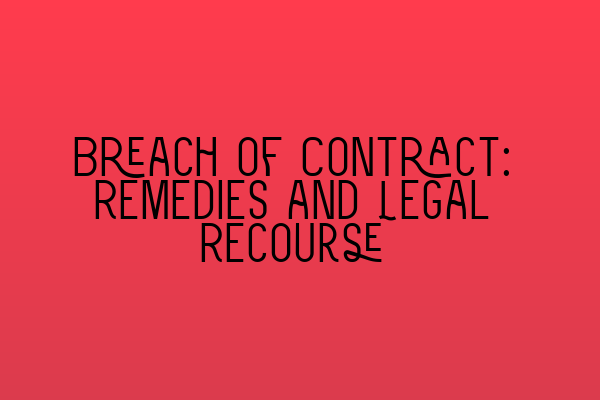Breach of Contract: Remedies and Legal Recourse
Contracts are an essential part of conducting business and ensuring that agreements between parties are upheld. However, there are times when one party fails to fulfill their obligations, resulting in a breach of contract. In such cases, it is crucial to understand the remedies and legal recourse available to the aggrieved party.
Understanding Breach of Contract
A breach of contract occurs when one party fails to perform their obligations as stipulated in the agreement. This can include failing to deliver goods or services on time, delivering subpar quality, or not fulfilling any other terms of the contract. When a breach occurs, it can lead to financial losses and damages for the innocent party.
It is important to note that not all breaches are equal. Breaches can be categorized into two types: minor breaches and material breaches. A minor breach, also known as a partial breach, occurs when the obligated party fails to perform a minor aspect of the contract. On the other hand, a material breach is a significant failure to perform a major part of the contract.
Now that we have a basic understanding of breach of contract, let’s delve into the remedies available to the aggrieved party.
Remedies for Breach of Contract
1. Damages: Damages are the most common remedy sought for breach of contract. The purpose of damages is to compensate the innocent party for the losses suffered due to the breach. There are two types of damages:
- Compensatory Damages: These are awarded to reimburse the innocent party for the actual financial losses incurred. The goal is to place the aggrieved party in the position they would have been if the contract had been performed correctly.
- Consequential Damages: Also known as special damages, these are awarded when the breach results in additional losses beyond the direct damages. For example, if a delayed delivery of goods causes the innocent party to lose a lucrative business opportunity, they may seek consequential damages.
3. Rescission: Rescission involves canceling the contract and returning the parties to their pre-contractual positions. This remedy is often sought when fraud or misrepresentation occurred during the formation of the contract.
4. Restitution: Restitution aims to restore the innocent party to their pre-contractual position by returning any property or funds transferred as part of the contract. This remedy is applicable when one party has been unjustly enriched at the expense of the other.
These are the primary remedies available for breach of contract. However, it is important to note that the appropriateness of each remedy depends on the specific circumstances of the case.
Legal Recourse for Breach of Contract
If you find yourself on the receiving end of a breach of contract, it is crucial to take immediate legal action to protect your rights and interests. Here are the steps you should consider:
- Review the Contract: Familiarize yourself with the terms and conditions of the contract to determine if a breach has occurred. Pay close attention to any clauses related to remedies and dispute resolution.
- Document the Breach: Gather evidence to demonstrate that a breach has indeed taken place. This may include emails, invoices, or any other communication related to the contract.
- Consult with an Attorney: Engage the services of a qualified solicitor who specializes in contract law. They will provide you with legal advice and guide you through the process.
- Send a Formal Notice: Your solicitor will help you draft a formal notice to the breaching party, highlighting the breach and the action you expect them to take to remedy the situation.
- Negotiation or Mediation: If both parties are open to resolving the issue outside of court, negotiation or mediation may be pursued. This can save time and costs, but the outcome depends on the willingness of the breaching party to cooperate.
- Litigation: If all attempts at negotiation fail, litigation may be necessary. Your solicitor will represent you in court and present your case to seek the desired remedy for the breach of contract.
It is important to seek legal advice as soon as possible to ensure that you comply with any applicable time limits for initiating legal action.
Remember, breach of contract cases can be complex, and the outcome depends on various factors. Working with an experienced solicitor can significantly increase your chances of obtaining a favorable resolution.
For more information on legal matters and career opportunities in the legal field, check out these related articles:
- Mentorship for Aspiring Solicitors: Nurturing Talent in the Legal Field
- Legal Challenges and Pitfalls: Navigating the Complexities of the Legal System
- The GDL (Graduate Diploma in Law): A Pathway to Becoming a Solicitor
- Mastering the Solicitor’s Path: Prepare for the Journey Ahead
- The Benefits of Becoming a Solicitor: A Rewarding Career
Should you require legal assistance regarding breach of contract or any other legal matter, do not hesitate to contact SQE Contract Law. Our team of experienced solicitors will provide expert guidance and fight for your rights.
